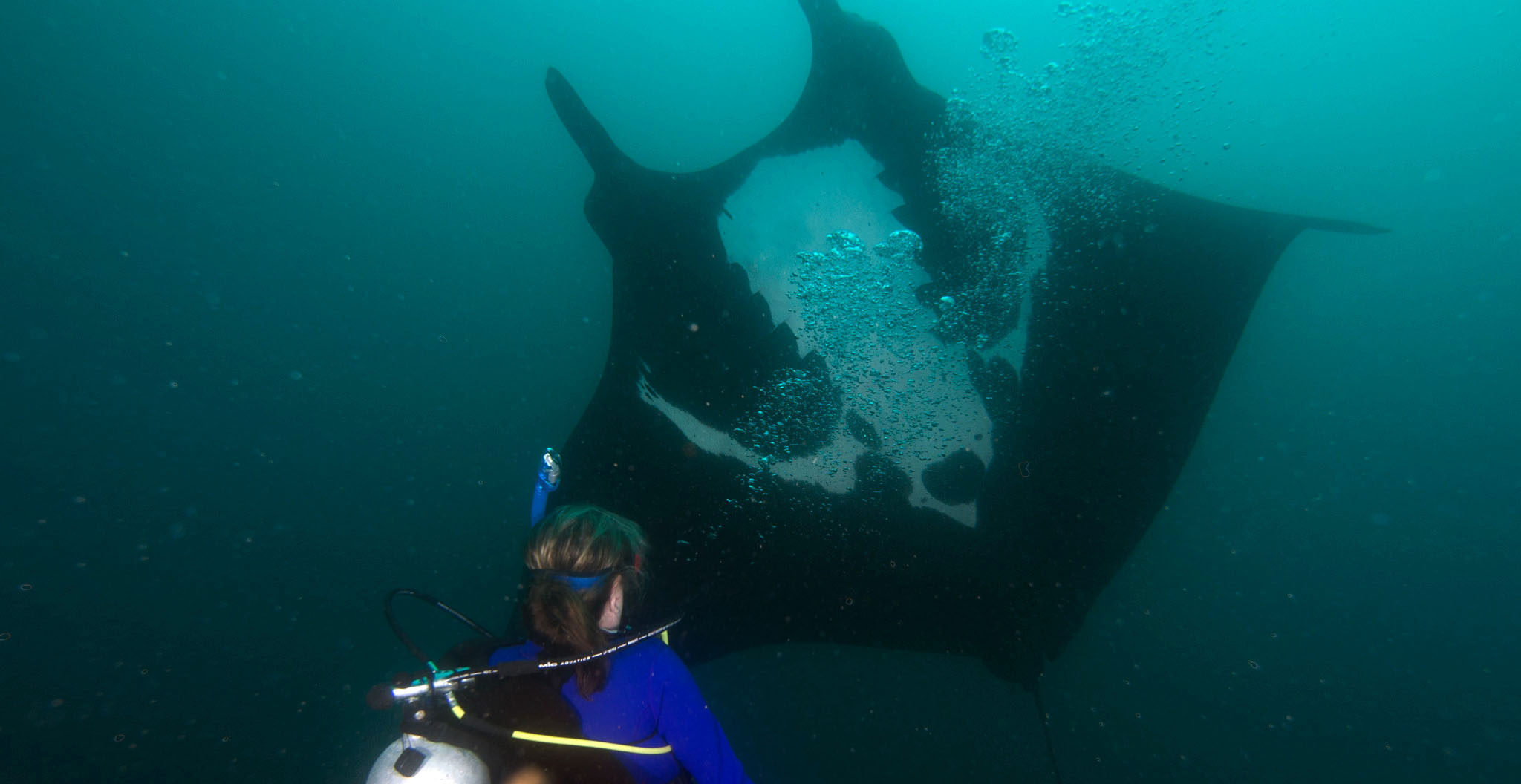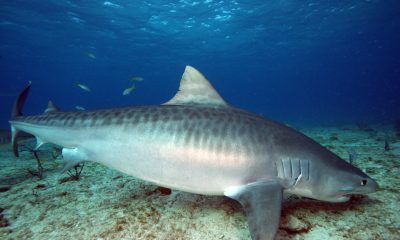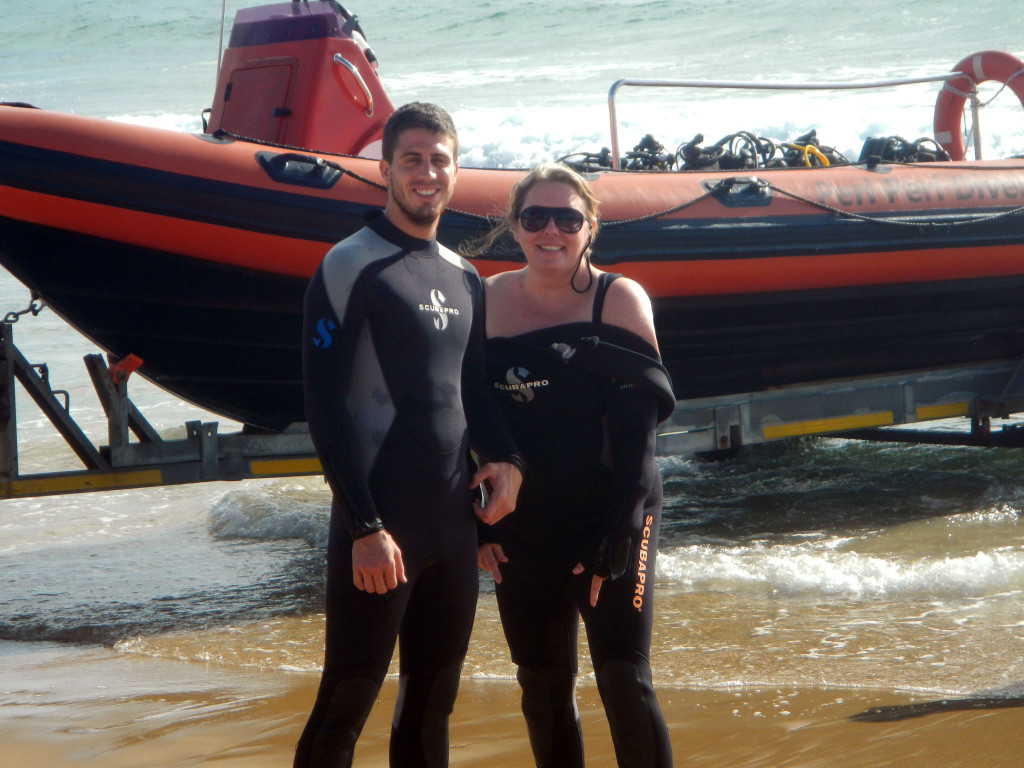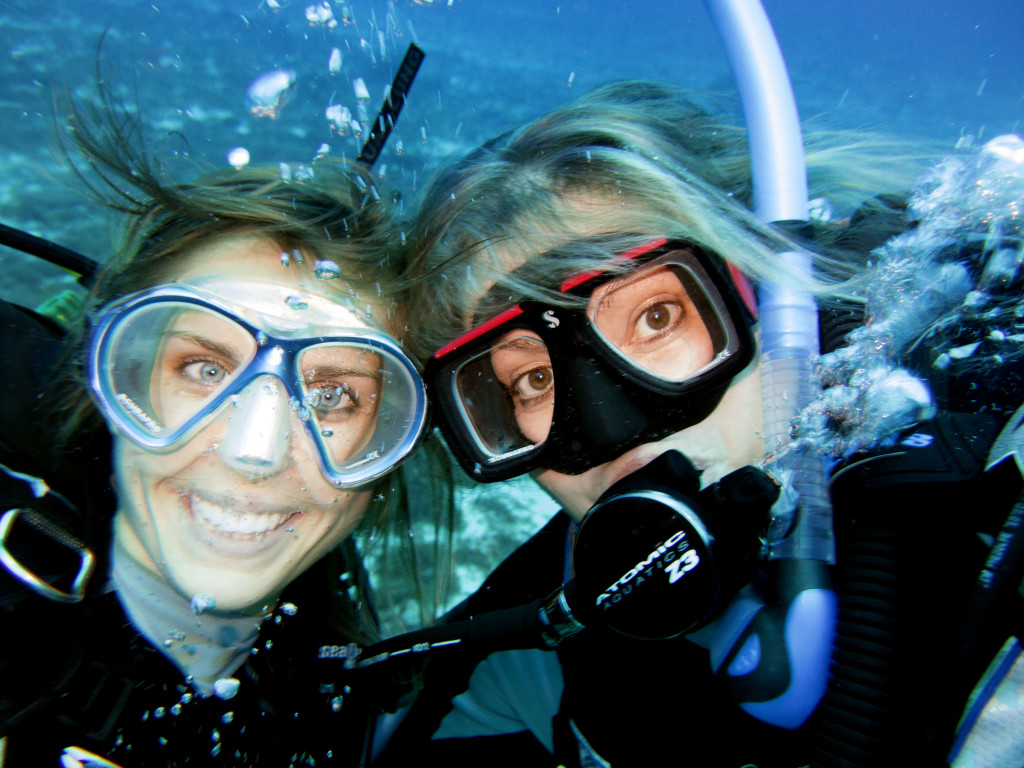Marine Life & Conservation
Do Something EXTRAORDINARY

A few years ago, I saw a BBC documentary that prompted a life reinvention. The documentary was about two marine biologists living in Tofo, Mozambique, studying Manta Rays and Whale Sharks. I was captivated by the Mantas… I had never seen one while diving or snorkeling before, only through binoculars on the surface of the water. Having already had some experience with Whale Sharks, I was also extremely interested in their ecology. The scientists, Dr. Andrea Marshall (aka Queen of Mantas) and Dr. Simon Pierce, were studying these species which at that time were so abundant in Mozambique waters (Sadly, the populations are now significantly impacted by unsustainable fishing practices). Their organization is Marine Megafauna Foundation (marinemegafauna.org).
I began searching for dive trips where I could do some volunteer work, even to just do fish counts. All Out Africa (www.alloutafrica.com) had a program working with Whale Shark Identifications and fish population counting in Tofo, Mozambique… helping with the whale shark program I had seen on the documentary! I thought, why can’t I do that? It was for adults, not a high school or college program or a gap year, but for adults. My family had a few reasons they did not want me traipsing off to Africa by myself, and I suppose there were some good reasons among them, but I made the decision to go. I booked my trip.
It appears crazy, absolutely nuts, to pick up and head off to Africa for 6 weeks by yourself, to live in an unpopulated area where there are no doctors, and the closest thing to a town, Inhambane, was at least an hour away. Was there a Decompression chamber in case of getting “the bends”, or decompression sickness? No. The closest one was in Johannesburg. Not a hop skip and a jump away. The message? Don’t get sick.
So off I went, a midlife woman with a passion for diving and animals, off on my very own adventure. It was the best gift I ever gave myself. I was tested physically (I’ve had two back surgeries and a few other physical limitations), and I was tested mentally… the experience empowered me, and helped me appreciate my abilities in an entirely new way. The trip was challenging, the environment both exhilarating and disturbing, and certainly the living standard was not what I was used to.
Diving in rough water was a new experience because the currents and surges off of Mozambique are strong. The water is cold. It took me a few dives to get comfortable, and truthfully, my first two dives were pretty awful. But, I adapted. I learned. I stayed in a house of volunteers, sharing a bathroom with the house and a bedroom with a roommate, and ended up with some close friendships even though I was the oldest one there, most of the volunteers being Europeans in their twenties. I have seen these friends since the trip, we keep in touch, and we have enjoyed diving together in other locales. I also went on another “citizen science” trip just this year, to Ecuador. I can’t wait for the next one. There will be more “citizen science” trips in the future, count on it.
Have you ever wanted to do something you thought was “out there”? Do you have a desire to get out into the world and make a difference? There are volunteer programs all over the world for adults. Most of them have nothing to do with scuba, and there are plenty of them on all continents. I have some advice for you: be bold. Why not look into it? Eco-tourism, volunteer tourism, will take you to places you’ve only dreamed of.
Let’s face it: if you dream of doing something, you’d better do it now. Tomorrow is promised to no one, and in midlife who knows what is coming next? Do something Extraordinary for yourself, you won’t believe how empowered it will make you feel!
For more from Tam, visit www.travelswithtam.com.
Marine Life & Conservation
Leading UK-based shark conservation charity, the Shark Trust, is delighted to announce tour operator Diverse Travel as a Corporate Patron

 Corporate Patrons provide a valuable boost to the work of The Shark Trust. The Trust team works globally to safeguard the future of sharks, and their close cousins, the skates and rays, engaging with a global network of scientists, policymakers, conservation professionals, businesses and supporters to further shark conservation.
Corporate Patrons provide a valuable boost to the work of The Shark Trust. The Trust team works globally to safeguard the future of sharks, and their close cousins, the skates and rays, engaging with a global network of scientists, policymakers, conservation professionals, businesses and supporters to further shark conservation.
Specialist tour operator Diverse Travel has operated since 2014 and is committed to offering its guests high quality, sustainable scuba diving holidays worldwide. Working together with the Shark Trust will enable both organisations to widen engagement and encourage divers and snorkellers to actively get involved in shark conservation.
“Sharks are truly at the heart of every diver and at Diverse Travel, we absolutely share that passion. There is nothing like seeing a shark in the wild – it’s a moment that stays with you forever!” says Holly Bredin, Sales & Marketing Manager, Diverse Travel.
“We’re delighted to celebrate our 10th year of business by becoming a Corporate Patron of the Shark Trust. This is an exciting partnership for Diverse and our guests. We will be donating on behalf of every person who books a holiday with us to contribute towards their vital shark conservation initiatives around the world. We will also be working together with the Trust to inspire divers, snorkellers and other travellers to take an active role – at home and abroad – in citizen science projects and other activities.”
Paul Cox, CEO of The Shark Trust, said:
“It’s an exciting partnership and we’re thrilled to be working with Diverse Travel to enable more divers and travellers to get involved with sharks and shark conservation. Sharks face considerable conservation challenges but, through collaboration and collective action, we can secure a brighter future for sharks and their ocean home. This new partnership takes us one more valuable step towards that goal.”
For more information about the Shark Trust visit their website here.
For more about Diverse Travel click here.
Marine Life & Conservation
Shark Trust Asks Divers to help with Shark Sightings this Global Citizen Science Month

 Whether you are stuck for ideas of what to do with the kids or are off on the dive trip of your dreams. You can get involved in Citizen Science Month and help the Shark Trust by providing vital data about sharks are rays both close to home and further afield.
Whether you are stuck for ideas of what to do with the kids or are off on the dive trip of your dreams. You can get involved in Citizen Science Month and help the Shark Trust by providing vital data about sharks are rays both close to home and further afield.
In addition to reporting the sharks and rays you see on your dives, the eggcases you find on the beach, the Shark Trust is looking for some specific data from divers who are asked to report any Oceanic Whitetip and Basking Sharks.
Oceanic Whitetip Sharks
The Shark Trust are looking specifically for Oceanic Whitetip Shark sightings over the coming weeks and months. So, if you are diving anywhere in the world, please report your sightings via the website or app.
Website: https://recording.sharktrust.org/
App: Search The Shark Trust in your app store
The Oceanic Whitetip. Known for their incredibly long dorsal and pectoral fins, this species was once the most abundant oceanic-pelagic species of shark on the planet.
Large and stocky, they are grey or brown above, and white below and famous for their huge rounded first dorsal fin and paddle-like pectoral fins. The fins also highly prized within the shark fin trade. Whilst they are mostly solitary, Oceanic Whitetips do occasionally hunt in groups.
An inquisitive species, they were easy prey for fisheries. Combined with their low reproductive rate, they were inevitably at high risk of population depletion. And declines of up to 99% have been reported in certain sea areas. They are listed as Critically Endangered on the IUCN Redlist (2019).
Conservation efforts to discourage further declines include listing on CITES Appendix II and CMS Appendix I. They’re also the only species prohibited from take by all the Tuna RFMOs (Regional Fisheries Management Organisations). However, these measures do not mean that Oceanic Whitetips are not still caught – whether targeted or as bycatch – in some parts of the world. With populations declining at such a high rate, effective implementation of management measures is essential to ensure that the species can recover.
If you are lucky enough to get an image of an Oceanic Whitetip and you record your sighting on the Shark Trust app or website YOU CAN WIN! All images submitted with sightings, that also give consent to use in conservation messaging, will be in with a chance to win an Oceanic Whitetip T-shirt and mug. The competition will run until the end of “Shark Month” in July – so keep those sightings (and images) coming in.
Basking Sharks
Basking Shark (Cetorhinus maximus) season is upon us, and the Shark Trust is asking everyone to keep an eye out for these majestic giants over the summer months. If you see any, you can record your sighting to the Basking Shark Sightings database.
Each year, these mighty fish return to British waters to feed on plankton. You may see one, (or a few if you’re really lucky) from around April-October. They can be seen feeding at the surface of the water, where they look like they’re basking in the sun. Thus, their name!
Sighting hotspots around the British Isles include southwest England, Isle of Man, north coast of Ireland, and western Scotland. The Sea of the Hebrides is the most prolific sightings area in Scotland, but they have been spotted all around the coast and have even ventured into some of the sea lochs. The Shark Trust has received thousands of sightings since the Basking Shark project began, but more data is needed to truly understand what is going on with population numbers and distribution. You can help by recording your sightings this summer.
Great Eggcase Hunt
The Shark Trust has an Easter Egg Hunt with a difference for you to try. Take part in the Great Eggcase Hunt and get involved with a big citizen science project that helps shark, ray and skate conservation. And it’s an enjoyable activity for all the family.
The Shark Trust also want snorkellers and divers to record their underwater eggcase findings. Underwater records help pinpoint exactly where sharks and skates are laying their eggs and can help link to beach records. Learning the depth and substrate that they lay on also helps better understand the species.
Find out more: https://www.sharktrust.org/great-eggcase-hunt
Whether you are diving, snorkelling or exploring on the beach you can take part in Citizen Science Month and get actively involved in shark and ray conservation. Find out more: www.sharktrust.org
-

 News3 months ago
News3 months agoHone your underwater photography skills with Alphamarine Photography at Red Sea Diving Safari in March
-

 News2 months ago
News2 months agoCapturing Critters in Lembeh Underwater Photography Workshop 2024: Event Roundup
-

 Marine Life & Conservation Blogs2 months ago
Marine Life & Conservation Blogs2 months agoCreature Feature: Swell Sharks
-

 Blogs1 month ago
Blogs1 month agoMurex Resorts: Passport to Paradise!
-

 Gear News3 months ago
Gear News3 months agoBare X-Mission Drysuit: Ideal for Both Technical and Recreational Divers
-

 Blogs2 months ago
Blogs2 months agoDiver Discovering Whale Skeletons Beneath Ice Judged World’s Best Underwater Photograph
-

 Gear Reviews2 months ago
Gear Reviews2 months agoGear Review: Oceanic+ Dive Housing for iPhone
-

 Blogs3 months ago
Blogs3 months agoThe Thrilling Encounter with Tiger Sharks at Beqa Lagoon’s ‘The Colosseum’ with Coral Coast Divers











